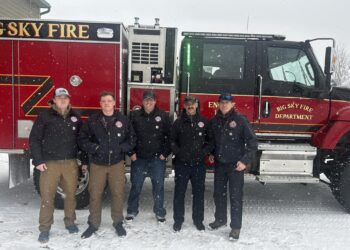
By Todd Wilkinson EBS Environmental Columnist
Peter Metcalf isn’t just any rock climber who turned his risk-taking yen for adventure into a lucrative business career. Nor is he just another garden-variety environmentalist emphasizing the need for responsible human interaction with the great outdoors if fragile natural wonders are going to persist.
Late in 2015, Metcalf, a Utah alpinist who has spent significant time in the Tetons, was named board chairman for the Salt Lake City branch of the Federal Reserve.
Part of the Fed’s expertise is formulating forward-thinking economic policy based upon knowing what has failed in the past and what is likely to endure in the headwinds of global trends. It has a parallel, Metcalf says, in the way Theodore Roosevelt thought about the democratic ideal of public lands.
Metcalf, CEO emeritus of the mountain gear company Black Diamond, has become an eloquent national leader touting the dividends of a clean and healthy environment. Going forward, he told me recently, unspoiled settings will be powerful magnets for attracting commerce and mobile human capital.
Metcalf has delivered testimony on this subject before Congress and, along with executives from the largest outdoor gear manufacturers in the U.S., is a no-holds-barred defender of federal public lands.
At a March rally in Salt Lake that attracted an overflow crowd of 600 people, he singled out Congressman Rob Bishop of Utah, chairman of the House Natural Resources Committee, and Bishop’s controversial Public Lands Initiative.
Bishop is an agitator in the illegal campaign to transfer federal public lands into the hands of states, an agenda not only roundly rejected by those who hold title to the land – the American people – but it’s a torch being inexplicably carried by U.S. Rep. Cynthia Lummis of Wyoming, and radicals like jailed Sagebrush Rebel Cliven Bundy.
Metcalf knows what the end game would be: Because states can’t afford the costs of maintaining federal public lands, many would likely be sold off to wealthy private buyers or managed according to the desires of influential resource extraction industries. Casualties would be public access for public recreation, diminished wildlife and the habitat it needs, clean air and water, and, of course, the social glue that holds the West together.
“Unfortunately our political leadership’s vision of Utah’s future is as farsighted as that of projecting their rearview mirror view of the past out the windshield of the future,” Metcalf told the crowd. “They believe the way forward is almost exclusively through the exploitive and extractive legacy industries of oil and gas, tar sands, uranium and coal mining, timber and overgrazing.”
“Yes,” Metcalf added, “these 19th and much of the 20th century industries that exploited the public lands, did provide reasonable economic opportunities to some in an era of frontier Manifest Destiny and the Cold War nuclear arms race, but they ran their course. Remember Moab in the mid-1980’s before climbers, mountain bikers, canyoneers and hikers? You could have bought main street with your credit card.”
There has never in history been economic boom-and-bust cycles produced by wildlife and landscape conservation like there is with the community-destroying whiplashes that have become synonymous with natural resource extraction.
Boomtown attitudes that rose in Wyoming and now are crestfallen with natural gas prices, ironically devastating demand for coal, may have created an adrenalin rush in the short term, but there is nothing that’s meaningfully sustainable.
While Wyoming, with each successive boom going back generations, has vowed to never get blindsided again, every inevitable bust has delivered a deer-in-the-headlights moment yet little self-reflection. Now politicos in Wyoming, Utah, Idaho, Montana and other states want to give away a birthright of citizens.
What makes Wyoming, Montana and the rest of the West extraordinary in the world, Metcalf says, is its wealth of unspoiled federal public lands. Once gone, he noted, they’ll be gone forever.
“The PLI is an all-out assault on the quality-of-life foundation that our current economic and cultural vibrancy is built upon,” Metcalf said to huge applause in Salt Lake. “It represents either a failure by our current political leadership to understand what is making us the desired place to live and work or it symbolizes just how beholden they are to the dying exploitive industries that fund their campaigns.”
That’s not forward thinking, he says; it’s backward.
New West columnist Todd Wilkinson is author of “Grizzlies of Pilgrim Creek, An Intimate Portait of 399, the Most Famous Bear of Greater Yellowstone” featuring photos by Thomas Mangelsen and only available at mangelsen.com/grizzly. Mangelsen is featured in Wilkinson’s story, “The Shooter,” published in the current issue of Mountain Outlaw magazine now on newsstands.










